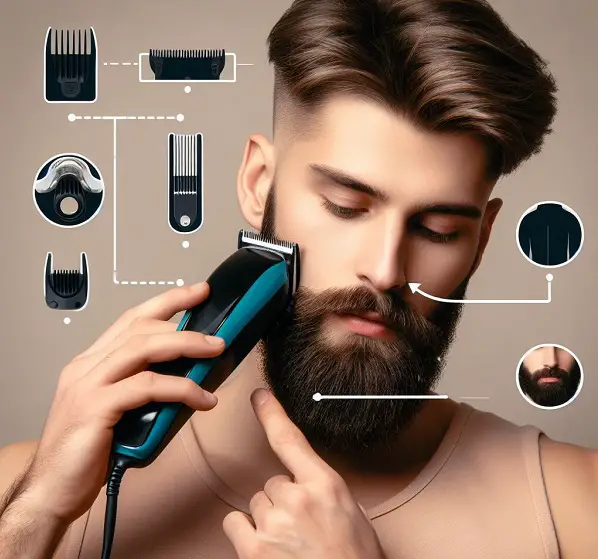In the world of grooming and personal hygiene, a well-maintained beard can make a significant impression. To achieve a neat and stylish beard, it’s essential to know how to use a beard trimmer properly. This comprehensive guide will walk you through the steps, tips, and tricks for achieving a perfectly groomed beard.
How to Use Beard Trimmer Properly?
To use a beard trimmer properly:
- Start with a clean and dry beard.
- Choose the desired trim length and attach the appropriate guard.
- Trim in the direction of hair growth.
- Start with longer settings and gradually go shorter for precision.
- Use steady, even strokes to trim evenly.
- Pay attention to the neck and jawline for a defined look.
- Clean the trimmer after use for longevity.
- Moisturize and maintain your beard as needed for a polished appearance.
Selecting the Right Beard Trimmer
Choosing the right beard trimmer is the first step in achieving a perfectly groomed beard. Consider factors such as the type of trimmer (corded or cordless), blade material, and attachments for different length settings. Invest in a quality trimmer that suits your needs.
Preparing Your Beard
Before you start trimming, make sure your beard is clean and dry. Washing it beforehand removes dirt and makes it easier to trim evenly. Comb through your beard to remove any tangles.
Setting the Trimmer Length
Select the desired length setting on your trimmer. It’s advisable to start with a longer setting and gradually trim shorter until you achieve the desired length. This prevents accidentally cutting too much.
Trimming the Neckline
Define your neckline by trimming the hair below it. A common mistake is trimming too high, so use your Adam’s apple as a reference point. Trim in a gentle curve to maintain a natural look.
Trimming the Cheek Line
Trim the hair above your cheekbones to create a clean cheek line. Follow your natural cheekbone shape and avoid trimming too much, as it can lead to an unnatural appearance.
Shaping the Mustache
Use a precision attachment or lower the trimmer’s length setting to shape your mustache. Trim from the center outwards, maintaining the desired thickness and style.
Trimming the Beard Length
Starting from the top, work your way down to trim the beard to your desired length. Use slow, even strokes, and ensure the trimmer moves in the direction of hair growth for an even cut.
Maintaining Even Length
Check your beard in different angles to ensure an even length. Make any necessary adjustments to achieve symmetry.
Cleaning Your Beard Trimmer
After every use, clean your trimmer to remove hair and prevent bacterial growth. Most trimmers come with a small brush for this purpose. Keeping it clean ensures longevity.
Oiling the Blades
Regularly lubricate the trimmer blades with the provided oil. This prevents friction, maintains sharpness, and prolongs the trimmer’s life.
Avoiding Common Mistakes
Be cautious around tricky areas like the jawline and chin. Start with longer settings and gradually work your way down to avoid mistakes.
Post-Trimming Care
After trimming, wash your beard to remove any loose hairs. Apply a beard balm or oil to moisturize and condition the hair and skin underneath.
Styling Your Beard
Experiment with different styles and shapes to find the one that suits you best. Don’t be afraid to use beard grooming products to achieve your desired look.
Conclusion
Mastering the art of using a beard trimmer properly is essential for maintaining a well-groomed beard. With the right equipment, technique, and care, you can confidently style your beard to perfection.
FAQs
1. How often should I trim my beard?
It depends on your beard’s growth rate and style preference, but typically, every 1-2 weeks is a good starting point.
2. Can I use a beard trimmer on wet hair?
Most beard trimmers are designed for dry use. Wet trimming may be possible with specific waterproof models.
3. Should I use scissors or a trimmer for detailing?
A trimmer is generally more precise for shaping and detailing, but small scissors can also be useful for fine-tuning.
4. Can I share my beard trimmer with someone else?
It’s not advisable due to hygiene concerns. Personal trimmers should be used by one person to prevent the transfer of bacteria.
5. Is it necessary to oil the trimmer blades regularly?
Yes, regular oiling ensures smooth operation, extends the trimmer’s life, and prevents irritation caused by dull blades.
